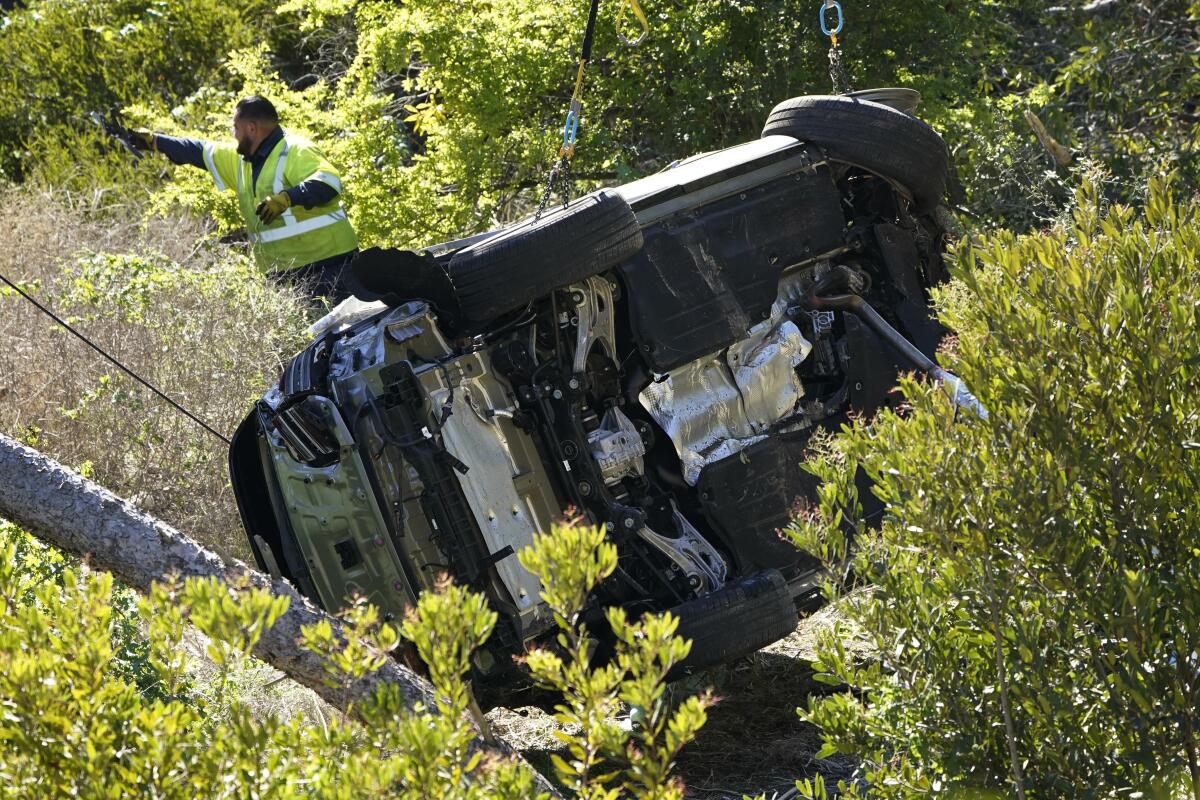L.A. County sheriff obtains search warrant in Tiger Woods crash, seeking SUV data

- Share via
Seeking answers to why Tiger Woods crashed on a dangerous stretch of a Palos Verdes Peninsula highway, a Los Angeles County sheriff’s traffic investigator has obtained a search warrant for the pre-crash data from the Genesis GV80 SUV’s onboard computer systems.
The warrant comes after Los Angeles County Sheriff Alex Villanueva last week called the rollover crash “purely an accident.” The department is seeking the information from the SUV‘s so-called black boxes to determine the cause of the crash and to reconstruct the incident to determine if the golfing legend was driving at an unsafe speed or was distracted or affected by something else inside the vehicle.
Deputy Carlos Gonzalez, the crash investigator who was also the first deputy at the scene and found Woods, 45, in the mangled wreckage, did not seek a warrant for the golfer‘s toxicology from Harbor-UCLA Medical Center, where the athlete underwent surgery on his lower right leg and pins and rods were inserted.
Gonzalez said he determined at the scene that Woods was not under the influence, and therefore there was no probable cause for such a blood draw. Woods was calm and lucid, he added. Villanueva also said that no evidence suggested the golfer’s actions rose to reckless driving and that this was more likely an infraction offense.
“We are hoping it will be quick with this black box,” Villanueva said. “The speed … was maybe a factor in this accident.
“You can have driver’s inattention, you can have any distraction like that, you can have speed involved,” he added. “The point of contact where he hit the center medium is downhill and a curve, and that stretch of road has had quite a few accidents over the years.”
Experts say that although an SUV like the Genesis has advanced computers and more pre-crash data are available, the computer data are not equivalent to the information on a jetliner’s flight recorder. But such systems operate as event data recorders that can capture the speed, braking, airbag deployment, seat belt locking, directions and movement of the vehicle.
Under National Highway Traffic Safety Administration rules for more recently built vehicles, the event data recorders must record 15 data inputs. Those include engine revolutions per minute, steering, the length and force of the crash, and what braking occurred during a crash.
With more vehicles now having such data, larger police agencies with crash expertise can now download the data and in a deadly collision with large insurance claims, the data can even end up in civil litigation to bolster or contradict a driver’s account.
The Driver Privacy Act of 2015 requires the protection of a driver’s data privacy; a law enforcement agency must obtain a search warrant to access such information. Woods was driving a tournament car for the recently finished Genesis tournament at the Riviera Country Club that he had hosted.
The Driver Privacy Act only narrowly applies to the “black box,” but privacy advocates say the vehicle’s infotainment system may also provide information about a driver’s behavior.
More to Read
Sign up for Essential California
The most important California stories and recommendations in your inbox every morning.
You may occasionally receive promotional content from the Los Angeles Times.











